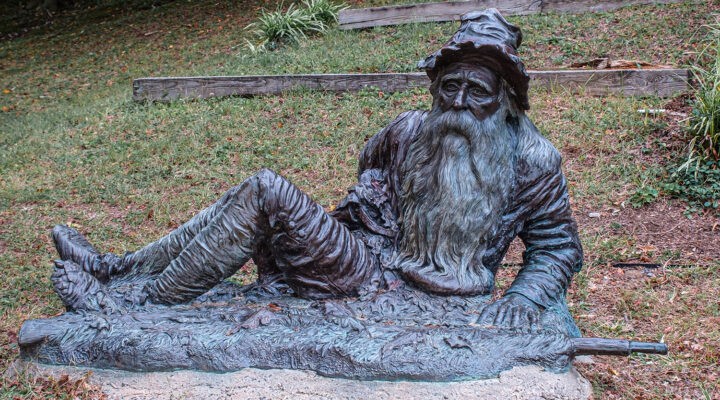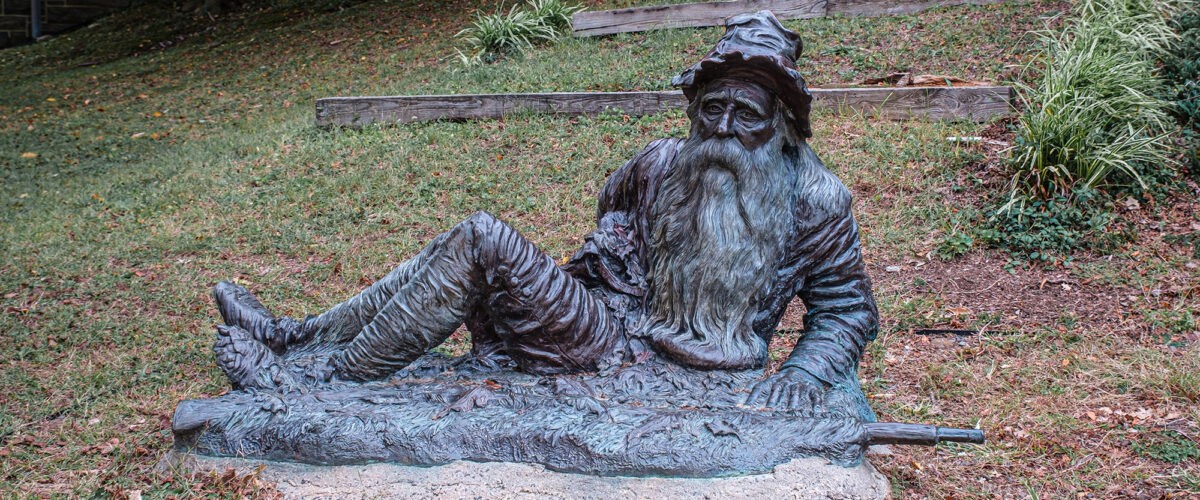In the last chapter of the last book he wrote titled, Where Do We Go from Here: Chaos or Community?, Martin Luther King recalled the Washington Irving story of Rip Van Winkle who fell asleep for 20 years on a New York mountain. What confused him most when he awoke was the sign on the front of the inn in the little town on the Hudson River.
When he went up for his long nap, the sign had a picture of King George III. When he returned 20 years later, it had a picture of George Washington. King said the most striking thing about the story is not that Rip slept 20 years, but that he slept through a revolution that would alter the course of human history.
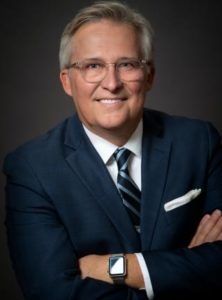
George Mason
And then he said this: Every society has its protectors of the status quo and its fraternities of the indifferent who are notorious for sleeping through revolutions.
Imagine a different story
Imagine with me how different history might have been if the church had not slept through one revolution after another. What if we had been awake to what God was up to in the world and cast a vision for it instead of working to protect the status quo?
This Sunday, many Christian churches read texts from Isaiah 62:1-5 and John 2:1-11. The Isaiah passages promises Israel: “You shall no more be termed Forsaken, and your land shall no more be termed Desolate; but you shall be called My Delight Is in Her, and your land Married; for the Lord delights in you, and your land shall be married.” The John passage tells the story of Jesus’ first public miracle at a wedding in Cana of Galilee.
In these accounts, as in the entirety of the Bible, we learn that the God of the Bible has a bias toward the last. The whole Bible is the story of the last being redeemed at last.
Most of the time in our churches we have proclaimed this to individuals. Your sin doesn’t have the last word about you, God does. Don’t focus on what’s lost because God sees what’s left. When you have lost a job or a marriage or a reputation, don’t give up. God hasn’t given up on you. God holds the future and grants eternal life to all who believe.
That’ll preach, don’t you know? And if that’s the word you most need to hear today, let the Spirit speak. But personal salvation is not the whole story of the Bible. So, here’s more.
A bias for the ‘last’
There are two senses of “last” that are relevant. “Last” in the sense of those who have been left out, pushed down and cast aside as if their inclusion in the gospel story matters as little to God as they seem to the world. And “last” in the sense of who gets the last word on what things will look like when God’s will is finally done on earth as it is in heaven.
The Bible is biased toward the “last” in both these senses. And if the church wants to represent God to the world, this must be our bias, too.
For that to happen, Christians need a sanctified, this-worldly, spiritual imagination. Instead of starting with what is and figuring out how to justify it as the will of God, we must start with the promises of God about what will be and work with God to bring them to pass.
Our faith teaches us to imagine and achieve, dream and become in the plural. We need to change our you’s to ya’ll’s. We need to shift our vision to match the Bible, not make the Bible fit our vision.
“We need to shift our vision to match the Bible, not make the Bible fit our vision.”
History isn’t inevitable
In Isaiah’s context, Israel had returned from captivity in Babylon and found the Promised Land of milk and honey to be an unpromising land of sour milk and hardened honey. But into that depressing city of Jerusalem, the prophet spoke a word of hope. God was with them. God was for them.
That was the last thing they could see with eyes of flesh. But with eyes of faith, they could see a land that would come to life again and be like a marriage of love and delight. The metaphor of a married land carries the idea of fruitfulness. God would have the last word on Israel.
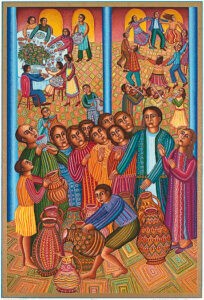
“Wedding Feast,” John August Swanson
And speaking of marriage, look at the story of Jesus at the wedding feast in Cana. The father of the bride was on the brink of embarrassment over the wine running out. But just then, Jesus’ mother intercedes. Mary somehow knows her Son has the power to make all things new. She imagines a different outcome because he is present. And when he finally acts, we are told that the guests marvel at how the wine served last is better than the wine served first.
See, history isn’t inevitable. As King said: “The moral arc of the universe is long, but it bends toward justice.” Things don’t have to be the way they are. But they won’t be different if people of faith can’t envision a better world and agitate for it the way Isaiah and Mary did.
Imagine a different American story
Imagine the American story if our country at the first had a bias toward the last.
By now we know that there is more than one origin story of America — one at Plymouth with the Pilgrims, the other Jamestown with enslaved people of African descent. But it didn’t have to be that way.
The Pilgrims weren’t the elite of English society. You don’t leave home in search of freedom and a better life if you are already at home and doing well. Those early settlers were Christians, but they weren’t the landed gentry. They were working class people on the fringes of society. But they were fueled by a vision of the New Jerusalem and a faith in the God of the last that came from texts like these.
What if our nation’s forebears in Plymouth and Jamestown had taken up the Bible’s bias toward the last? What if we hadn’t needed the 1619 Project to retell the origin story of America from the view of the last?
“What if we hadn’t needed the 1619 Project to retell the origin story of America from the view of the last?”
And what if the church in the antebellum South hadn’t read the Bible to justify slavery? What if John Broadus, one of the founders of the Southern Baptist Theological Seminary, hadn’t defended the Confederacy as the hope of preserving civilization, thereby setting Baptists on the side of human oppressors? What if during Reconstruction after the Civil War the church had supported the “40 acres and a mule” gift of land and opportunity to freed slaves? What if in Dallas, where in the 1920s one in three of all eligible white men were members of the Ku Klux Klan, the church had stood up against white supremacy and demanded our city be a home equally for all? What if our white city fathers had not made an accommodation with Black pastors to keep the Civil Rights Movement from bringing real change instead of surface peace?
We can write a different story
Well, that was then, but this is now. Happily, we have the same chance today to make things right that we have always had. Today we can reclaim the vision of Isaiah and rename the desolate land in our city. Today we can intercede with Jesus to bring out the best for us last.
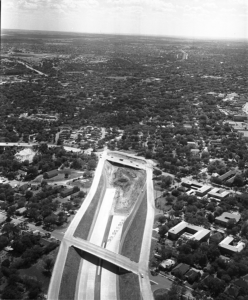
The building of I-30 through East Dallas divided four communities.
Here in Dallas, we’re finally facing up to our city’s first real accounting of how decisions were made to cut off parts of Dallas from being fruitful, neighborhoods populated by Black and Latino people. Much of the land in southern and western Dallas is still “unmarried,” to use Isaiah’s image. It is unmarried because it was cordoned off by highways built deliberately to prevent encroachment of Black neighbors into white neighborhoods. It is unmarried because of bank redlining that prevented Black renters from getting mortgages and becoming homeowners that would have built generational wealth. It is unmarried because all the landfills and dumps and toxin-producing businesses were permitted to be located there — something we never would have allowed to happen in our North Dallas neighborhoods. It is unmarried because public transportation was not linked to schools and jobs and services, because public schools and public libraries and public parks and community centers and code enforcement, and on and on, were neglected.
Even today, demography is destiny for too many in our city. The difference in male life expectancy in a two-mile stretch between the ZIP Codes 75215 in South Dallas and 75205 in Old East Dallas is 26 years.
But it doesn’t have to be that way. Things are not fixed or final. Not if the spirit of Isaiah and Mary still stirs. Not if the risen Christ is loose in our midst.
Just imagine the joy of God when all our neighborhoods are named My Delight Is in Her, and when together we taste the best wine last. If we can imagine it, we can achieve it. If we can dream it, we can become it. But it’s not just a we of you and me; it’s a we that includes the God with a bias toward the last.
George Mason serves as senior pastor of Wilshire Baptist Church in Dallas and is host of the Good God podcast. He has been active in racial and economic justice work for three decades.
Related articles:
Remembering the real Martin Luther King: Forgive us, Lord | Opinion by J. Alfred Smith
The re-assassination Of Martin Luther King Jr. | Opinion by Wendell Griffen
Faith with a conscience: Martin Luther King as a model dissenter for Baptists, present and future | Analysis by Christian McIvor
The Great Replacement is a lie and not Christian, Southern Baptist pastor explains
Once more, a knock at midnight | Opinion by Darrell Hamilton III
A letter to white Christian evangelicals | Opinion by Joel Bowman Sr.

